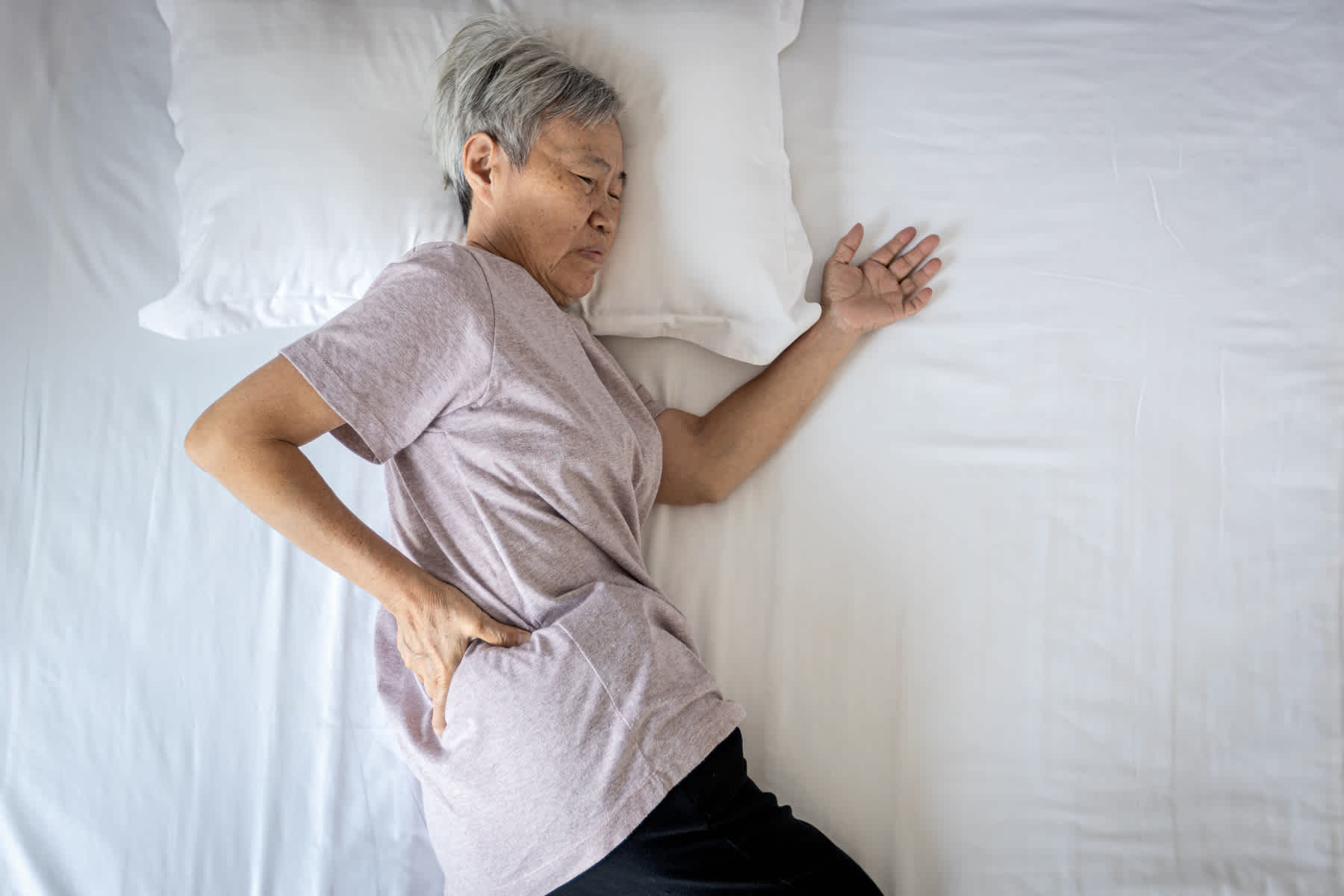Let’s be real—nothing messes up a good night’s sleep like hip pain. You finally get into bed, ready to relax, and then… that dull ache sets in. You shift to your side, then your back, maybe even try stacking pillows—but the discomfort just keeps coming. Sound familiar?
If you’re looking up how to relieve hip pain while sleeping, you’re not alone. At Simply Physio, we work with patients every week who struggle with hip pain that flares up at night—even if they feel fine during the day. The good news? There are real solutions. But first, you’ve got to understand what’s actually causing it.
What’s Going on in Your Hip at Night?
The hip joint is one of the most mobile and complex joints in the body. It’s a ball-and-socket joint that supports your weight, absorbs impact, and enables movement. But when you lie down, especially for several hours at a time, the way your hip aligns and bears pressure can make existing issues worse—or bring new ones to light.
This pain might come from the joint itself, surrounding muscles, nerves, or even posture problems. That’s why relieving hip pain while sleeping means looking at the bigger picture—how your body’s moving (or not), what you’re sleeping on, and what your hips are going through during the day.
Common Causes of Hip Pain at Night
1. Hip Bursitis
Bursae are fluid-filled sacs that reduce friction between tissues. When they get inflamed, you’ll feel sharp or throbbing pain on the outer side of your hip, especially when lying on that side.
2. Tendinitis or Muscle Strain
Overuse or irritation of the tendons (especially the glutes and hip flexors) can create nagging pain that gets worse when those muscles are compressed at night.
3. Hip Arthritis
Osteoarthritis can lead to stiffness, aching, and inflammation, especially after long periods of stillness—like sleep.
4. Sciatic Nerve Irritation
Not all hip pain starts in the hip. Sciatica, or nerve irritation in the lower back, can refer pain down through the hip and leg, especially if you’re in a curled or unsupported sleep position.
5. Poor Sleep Position or Mattress Support
Sometimes, it’s not an internal issue at all. A too-soft or sagging mattress, lack of alignment, or side-sleeping without proper support can create pressure and strain over time.
How to Tell What’s Causing It
It’s tempting to just grab a pillow and hope for the best, but it’s worth trying to figure out where the problem’s coming from. Start by asking yourself:
- Is the pain sharp, dull, or burning?
- Does it only happen when I sleep, or linger during the day?
- Which positions make it worse?
- Is the pain on the outside of the hip, deep in the joint, or radiating?
These details matter. A quick consultation at Simply Physio can help get to the root of it fast—before the pain gets worse or leads to compensation in your back, knees, or posture.
How to Relieve Hip Pain While Sleeping – Tips That Actually Work
1. Try Sleeping on Your Back (With a Twist)
If you’re usually a side sleeper, switching to your back can help reduce pressure on your hips. But lying flat can sometimes cause its own issues, especially if you have a sway back. Try placing a pillow under your knees to tilt your pelvis into a more natural position.
2. Support Your Hips When Side Sleeping
If you can’t give up side sleeping, make it work better. Use a firm pillow between your knees to keep your hips aligned and reduce rotation in your spine and pelvis. If the hip on the bottom hurts, consider doubling up your mattress support with a foam topper.
3. Upgrade Your Mattress or Topper
If your mattress is older than 7–10 years or feels like you’re sleeping in a hammock, it’s time for a change. A medium-firm mattress is usually the sweet spot for hip and back support. Adding a memory foam or latex topper can also improve pressure relief.
4. Warm Up Your Muscles Before Bed
This might sound counterintuitive—shouldn’t bedtime be about winding down? But light hip mobility exercises, gentle stretching, or a warm bath can reduce tightness and inflammation before you lie down. Think of it as prepping your joints for stillness.
5. Try Targeted Hip Stretches
A few to consider:
- Supine figure-4 stretch
- Piriformis stretch
- Kneeling hip flexor stretch
- Butterfly stretch
Don’t overdo it—just 5–10 minutes can help your hip settle down.
6. Use Heat or Ice (Depending on the Cause)
- Use heat for stiffness and tight muscles
- Use ice for inflammation or bursitis
We often recommend 10–15 minutes before bed—but make sure to place a cloth barrier between the skin and the ice/heat source.
When to See a Specialist
If your hip pain:
- Wakes you up more than 2–3 nights a week
- Lasts longer than 2 weeks
- Gets worse even with positioning changes
- Radiates down your leg or causes tingling/numbness
…it’s time to see someone. At Simply Physio, we offer customized physical therapy plans that go beyond generic stretches. We evaluate your posture, sleep position, muscle balance, and even how you sit during the day. Because believe it or not, hip pain at night often starts with daytime habits.
How Physical Therapy Can Help You Sleep Pain-Free
Our approach isn’t just about treating symptoms—it’s about fixing what’s causing the irritation in the first place. Here’s how PT at Simply Physio helps:
- Joint and muscle assessments to identify tightness, weakness, or imbalance
- Manual therapy to release stuck tissues or realign mechanics
- Corrective exercises to strengthen and support your hips
- Postural education so you’re not undoing progress during the day
- Sleep ergonomics advice tailored to your needs
We often hear patients say, “I wish I came in sooner.” Don’t wait until sleep feels impossible.
A Few Bonus Prevention Tips
- Avoid sitting for hours without standing and stretching
- Stay active during the day—motion is lotion for your hips
- Keep a healthy body weight to reduce joint stress
- Use a standing desk setup with good hip/knee alignment
- Don’t ignore early signs—tightness today can become pain tomorrow
Our therapists can show you hip-strengthening routines that take 5–10 minutes a day and actually make a difference.
Don’t Let Hip Pain Control Your Night
Getting solid, restful sleep is one of the most important things you can do for your body. So if hip pain is messing with that? It’s not something to just “tough out.” Relief is possible—and it starts with understanding what your body’s trying to tell you.
At Simply Physio, we’re all about giving you practical, science-backed solutions that help you sleep better, move better, and feel better.
Ready to Sleep Through the Night—Pain-Free?
Book a consultation at Simply Physio today, and let’s build a plan that gets you out of bed feeling better, not worse. Whether it’s bursitis, alignment issues, or a deeper joint problem—we’ve got the tools to help.
Don’t settle for another night of tossing and turning. Let’s fix the root, not just the symptoms.



